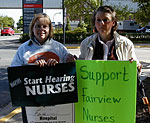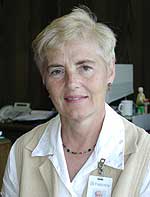By Tom Scheck
Minnesota Public Radio
June 26, 2002
One year ago this week, 1,300 nurses ended a 23-day strike against two metro area hospitals and returned to work. Nurses at Fairview University Medical Center in Minneapolis and Fairview Southdale in Edina struck for higher pay, improved benefits and better working conditions. One term of the settlement allows nurses to shut down a hospital unit to new patients, if they believe staff is stretched too thin. Hospital administration and the union say the provision helps, but doesn't fully resolve the underlying problem - a shortage of nurses.
| |
|
|
|
||
Union officials say Minnesota nurses at six metro area hospitals are the first in the nation to have won the right to refuse new patients in a unit, if they are short-staffed or overworked. Fairview Southdale nurse and union negotiator Jean Ross says the new agreement gives nurses a comfort zone that they didn't have before.
"The biggest help for the nurses with the closure language is...a respite, a break. Catch their thoughts, get things lined up, and work with a supervisor to see where else the help could be coming from. Things tend to stabilize within two hours. If it doesn't, they can close again for a longer period of time," Ross says.
When a unit closes, hospital officials have to make patients wait or send them to another hospital, while administrators and nurses figure out how best to address the workload.
Hospital officials at a number of hospitals estimate they've had to close units hundreds of times since the practice started last summer. Officials with Abbott Northwestern in Minneapolis say their latest numbers show they've closed units 170 times between August and March.
| |
|
|
|
||
Fairview Southdale Hospital in Edina had to close 90 times since it initiated the new policy last September. Jeanne Jacobson, Fairview Southdale's vice president of patient care, says hospital administrators had always closed units when they thought patient care was reaching unsafe levels. She says, however, the new policy allows them to communicate better with nurses directly involved with patient care.
"I think this has worked out well. This is a practice that we did informally before," Jacobson says. "It's not a completely new practice for us, but certainly it gives us a structure and a format on how to do it."
Jacobson says the two main reasons for closing units at her hospital are an unusual surge of patients at one time, and insufficient staffing levels. She says the nursing shortage at Fairview - and across Minnesota - compounds the staffing problems.
"If we had all of our positions filled we probably wouldn't very often need to close, because that means we always have sufficient staff to care for our projected average daily census," Jacobson says.
Minnesota has more than 3,000 open nursing positions, according to state figures. Hospital officials have started competing locally, nationally and internationally to get more people working in their hospitals. Nearly all hospitals are trying to attract nurses by offering bonus packages and student loan forgiveness programs.
| |
|
|
|
||
Regions Hospital in St. Paul is offering signing bonuses of up to $10,000 to nurses who sign a two-year contract with the hospital. Regions recruitment manager Ruth Bremer says her hospital has filled more than 65 positions since it started its program - which she refers to as "Sky High Bonus Days" - in April.
"As we were speaking internally here, as we started planning our strategy, it was pretty well understood that we needed to do something that would really be attention-getting," says Bremer.
Several health care officials worry that hospitals may be reshuffling the current workforce, without making major improvements to job conditions. Alice Swan, the associate dean for nursing programs at the College of St. Catherine, says many younger nurses have told her they wouldn't choose the profession if they could do it over again. Swan says many nurses complain the patient workload and fast pace at area hospitals are too much.
"I think some of the recruitment things are very positive. But will the retention things also be in place to retain the people, or will it be another kind of revolving door? I think it's important to look at those work environment issues," she says.
Swan says hospitals need to create better ways of keeping nurses in the profession. She says the average age of nurses is the mid-40s. She says the problem is expected to get worse as the nation's baby boomers continue to age, and demand for nursing care increases.
Union officials say workplace improvements are essential, and say they will continue to press for improvements when negotiations begin again in two years.
More from MPR


